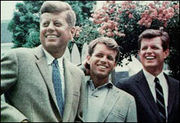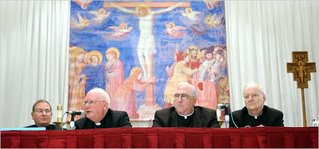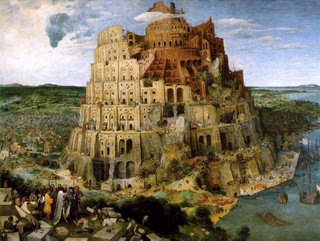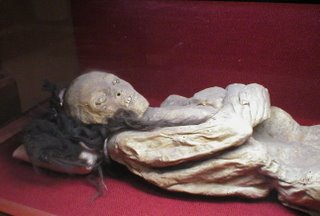
Very early on a Friday morning almost four weeks ago, Malachi Ritscher climbed onto the base of a 25-foot abstract sculpture entitled "Flame of the Millenium" in the center of an interchange along Chicago's Kennedy Expressway, and set himself on fire. He was wearing a hooded sweatshirt and a skull mask, and a U.S. flag was drapped over his head and shoulders. We know this begause he videotaped his own death. Nearby, Ritscher had planted a banner which read: "Thou Shalt Not Kill, " and "As Ye Sow So Shall Ye Reap," in black ink, and below that, "Your Taxes Buy Bombs and Bullets," in red ink. Despite his public self-immolation, the body was not identified for several days.
I learned only last Monday about the death of Malachi Ritscher on Nov. 3 from an Associated Press story in my local paper . Unlike the self-immolation of Buddhist monks during the Vietnam war, and several antiwar protestors in this country, such as Roger Allen LaPorte in front of the U.N. in 1965, his death was not front page news. The Chicago Sun-Times printed a small blurb and the Chicago Tribune ignored it. Until the independent web media and the bloggers got a hold of it. Now a Google search of Ritscher's name turns up almost 200,000 entries and stories are appearing in Paris and London and on MSNBC. There is a full Wikipedia entry. The Tribune finally printed its own version yesterday of Ritscher's fiery death with additional details from witnesses and the police.
But the most complete information comes from Ritscher himself, on his web site Chicago Rash Audio Potential. There he left a
 suicide note, called a "mission statement," and a self-written obituary which he called "out of time." There are also many photographs of Ritscher as a child and adult, including this one which is captioned "one last shot, october 2006." Besides Ritscher's own words, there is extensive posting from friends and family members, including his estranged son, on a Chicago Reader blog, Post No Bills, by Peter Margasak. And, finally, there is a web site, I Heard You Malachi, with information and thorough overviews by Nitsuh Abede, reprinted from PitchforkMedia.com, and graduate student Jennifer Diaz. Fliers and tee shirts are also available.
suicide note, called a "mission statement," and a self-written obituary which he called "out of time." There are also many photographs of Ritscher as a child and adult, including this one which is captioned "one last shot, october 2006." Besides Ritscher's own words, there is extensive posting from friends and family members, including his estranged son, on a Chicago Reader blog, Post No Bills, by Peter Margasak. And, finally, there is a web site, I Heard You Malachi, with information and thorough overviews by Nitsuh Abede, reprinted from PitchforkMedia.com, and graduate student Jennifer Diaz. Fliers and tee shirts are also available.All of this is pretty amazing, considering that the world at large, i.e. the narrow one which bases its information on American media, remains relatively unaware of Ritscher's martyrdom for peace in Chicago. Or was it the result of mental illness? That's the conclusion of his son and a few others, though some argue strongly that martyrdom and mental illness are not mutually exclusive. What's unusual is that anyone who accesses Ritscher's web site can draw their own conclusions about his mental state. He is remarkably articulate, passionately persuasive and even humorous.
Reportedly, his last words were 'rosebud...ooops'. (from his obit)I wish I had known him, and I honor his public death for what he believed in.
Mark David Ritscher was born in a small town in North Dakota 52 years ago. He dropped out of school and married at 17, fathering a son he named Malachi, after the Biblical prophet who was sharply critical of the priests and rulers of the people. When the marriage ended after 10 years, he moved to Chicago and took Malachi, which means "my messanger" in Hebrew, for his own name.
Ritscher tells us that he was a musician, a photographer, a poet and a painter, a lover of literature, a collector of everything from snare drums to fossil tully monsters and glass eyes,
 and "a man of strong contrasts and fierce loyalties." He was a member of Mensa and Alcoholics Annonymous and "practiced a personal and private spirituality, seeking to connect across the illustion that separates us from each other." Admitting to a fear of people, he had many acquaintances in the Chicago music scene where he could be found many nights a week recording for free local musicians, documenting over (by his count) 2000 shows. You can hear his own music on either of his two myspace pages, here and here. He had recently purchased a cemetery plot and chose for his epitath, "I Dreamt That I Was Dreaming."
and "a man of strong contrasts and fierce loyalties." He was a member of Mensa and Alcoholics Annonymous and "practiced a personal and private spirituality, seeking to connect across the illustion that separates us from each other." Admitting to a fear of people, he had many acquaintances in the Chicago music scene where he could be found many nights a week recording for free local musicians, documenting over (by his count) 2000 shows. You can hear his own music on either of his two myspace pages, here and here. He had recently purchased a cemetery plot and chose for his epitath, "I Dreamt That I Was Dreaming.""Malachi was an incredible and gentle soul," one friend told Sun-Times columnist Richard Roeper. He was reported to be kind, intelligent, funny, outgoing and polite, and others described him as warm, modest and a selfless individual. "He gave me peppers from his garden," a bartender cried when she heard what he had done. But he was also alone. In his obituary, he wrote: "He had many acquaintances, but few friends; and wrote his own obituary, because no one else really knew him." He wrote that his "metaphor for his life was winning the lottery, but losing the ticket." While he considered himself the "modern day equivalent of a 'renaissance man,' " he consistently failed in finding success," but "didn't really worry too much about it." Before he died, Ritscher was working on the night shift as a maintenance man at the University of Chicago.
Ritscher clearly intended his death to be a protest against the Iraq war and the Bush administration. In his "mission statement" he wrote:
When I hear about our young men and women who are sent off to war in the name of God and Country, and who give up their lives for no rational cause at all, my heart is crushed. What has happened to my country?
I too love God and Country, and feel called upon to serve. I can only hope my sacrifice is worth more than those brave lives thrown away when we attacked an Arab nation under the deception of "weapons of Mass Destruction." Our interference completely destroyed that country, and destablized the entire region. Everyone who pays taxes has blood on their hands.He even answers his potential critics:
Many people will think that I should not be able to choose the time and manner of my own death. My positions is that I only get one death, I want it to be a good one. Wouldn't it be better to stand for something or make a statement, rather than a fiery collision with some drunk driver?...Here is the statement I want to make: if I am required to pay for your barbaric war, I choose not to live in your world. I refuse to finance the mass murder of innocent civilians who did notthing to threaten our country...There might be some who say "it's a coward's way out" ... From my point of view, I am opening a new door.He ends his suicide note by writing, "Without fear I go now to God -- your future is what you will choose today."
I have written at length about the life and death of Malachi Ritscher because I find him a kindred soul, a prophet, whose passing leaves a wound in his family and community that cannot be healed easily. I do not recommend that anyone imitate his actions, however. For just as terrorism can never bring peace, I do not think that suicide affirms life in any way. Ritscher's death is a tragedy, not a mistake, not the whim of a mentally ill man. Heaven must have a special place for those who love that much.
















